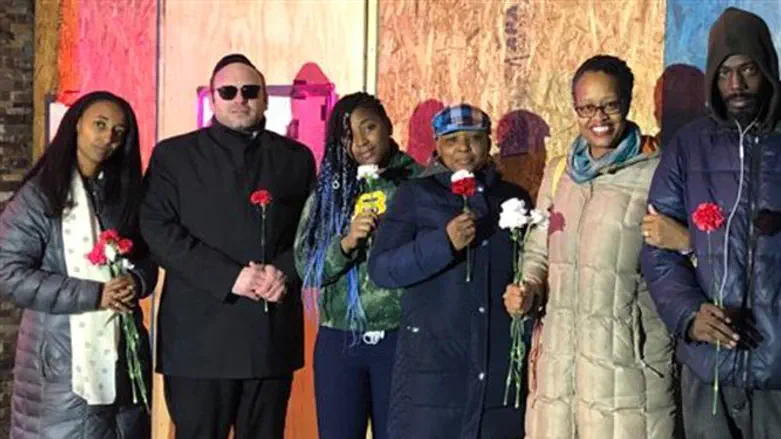
The deadly assaults in Jersey City and Monsey, together with the routine harassment of religious Jews in Brooklyn are the bitter harvest of long-term trends among American blacks. This reality has been hushed by mainstream media more concerned about blaming Trump for every act of hatred in America. This reality has been hushed by the liberal Jewish leadership more concerned about not slighting a loyal constituency of the Democratic Party.
Anti-Semitic trends in African-American communities are corroborated by surveys highlighting how anti-Jewish feelings are more pronounced among blacks than whites in America and particularly among younger and college-educated blacks. These African-Americans are told in college that American Jews support Zionism and that Israel oppresses dark-skinned Palestinians. These impressionable youths learn from BLM and pro-Palestinian activists that Israel was founded by white Europeans and proudly promotes apartheid and genocide.
In this constellation, the popularity of Islam among African-Americans plays a particularly poisonous role. I recently watched a Nation of Islam preacher charge Jews of exploiting blacks ever since the Reconstruction era and of running the NBA like a modern-day plantation. Since Islam has made heavy inroads among African-Americans and blacks now account for a fifth of Muslims in America, these faithful are routinely exposed to the hateful anti-Jewish rhetoric of mosques and of leaders like Louis Farrakhan. It would however be unfair to single out Islam for antisemitism. Christian political and religious leaders like Jesse Jackson and Al Sharpton have also peddled anti-Semitic tropes.
It would therefore be a grievous error to see the recent anti-Jewish violence as random or to blame religious Jews for the hostility they face. In a normal world we would be treating this phenomenon as another cultural failing affecting the African-American community. Nevertheless, we live in an era that construes violence of this kind as an understandable reaction to racism and oppression.
For this reason we can expect the following developments in coming months: The Reform movement will double-down on its efforts to defend “slavery reparations” for African-Americans. This will be done even though only a minuscule minority of American Jews descends from Southern slaveholders. In addition, we can expect a slew of initiatives aimed at combatting the supposedly rampant racism in Jewish religious communities. In coming seasons I expect a number of TV productions to highlight this theme.
I would love to see a Hollywood production about how the foreign-born Rabbi Dr. Abraham Joshua Heschel embraced Martin Luther King and the Civil Rights Movement. Another beautiful alternative could showcase how the philanthropist Julius Rosenwald paid for thousands of schools for African-American children to be built during the segregation era. In addition, Americans of all races should learn about the big role Jewish America played in helping African-Americans publicize their plight and secure rights during the 1950s and 1960s.
Nevertheless these hopes may very well be dashed. In the current cultural Zeitgeist it is just as likely that the plight of inner-city families evicted by black-hatted hassidim will earn a platform. Another promising script could involve a “bigoted” religious Jew from Brooklyn who is almost lynched by Trump supporters and gets rescued by a Nigerian Muslim transsexual refugee. In due time the friendship that develops between these characters allows the religious Jew to come out of the closet and admit that his despective opinions were due to patriarchal rabbinical oppression (after all, what else except repressed sexuality could trigger a poor opinion of inner-city culture?)
For these reasons Jews who are visibly Jewish should develop their own strategies to fight antisemitism. To begin, they must loudly demand that community leaders and politicians not mince words and be color-blind in attacking every manifestation of anti-Semitism. Black supremacist anti-Semites are potentially just as dangerous as white supremacists and Islamic anti-Semites. The closing weeks of 2019 amply corroborate this claim.
In addition, Jewish foundations should devote energies to disabuse the black community that Islam is the best religion for African-Americans. The noted Islamic scholar and UCLA professor Khaled Abou El-Fadl advocates a reform of normative Islam. In And God Knows the Soldiers: The Authoritative and Authoritarian in Islamic Discourses Professor El-Fadl argues that the Prophet of Islam became a champion of racial equality thanks to the fact that medieval Islamic scholars expunged reliable yet crudely racist sayings of Mohammed from Islamic hadith collections. Professor El-Fadl thus disingenuously claims that Mohammed could also become a champion of feminism if contemporary Muslims expunged Mohammed’s misogynist sayings from today’s hadith collections. The racist hadiths mentioned in this book and Islamic history in general amply demonstrate that Muslims historically relate to blacks primarily as slaves to be sold, bought and converted to Islam. African-Americans deserve to know these shameful chapters of Islamic history.
In the meantime, religious Jews should learn martial arts and be able to defend themselves everywhere. This advice does not exempt Jews living near inner-cities from the duty to occasionally smile to their neighbors and courteously wish them Happy Kwanzaa or Happy Martin Luther King Day. Nevertheless, whether these gestures are offered or not will probably do very little to stop the hatred and resentment against Jews of too many inner-city denizens. These religious Jews as often poor, yet law-abiding citizens who rarely succumb to drug and alcohol abuse, provide inner-city communities with an unwelcome mirror.
